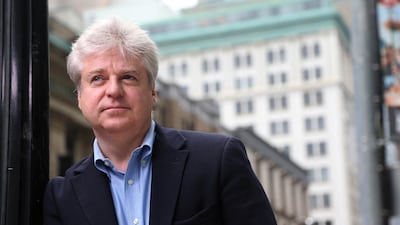There's one snippet of childhood advice thriller writer Linwood Barclay remains glad he ignored. "I started writing stories when I was 10 or 11 based on my favourite TV shows at the time, when everybody else was interested in sports," he recalls from his home in Toronto.
"One day the principal came to see me in class and said 'you know, Linwood, you would probably be doing better in math if you didn't spend quite so much time writing stories'. I've never forgotten that'." Not surprisingly.
Barclay, 64, has sold millions of books as one of the world's most popular crime thriller writers and his titles have been turned into TV series and films.
Barclay will impart some of his wisdom to pupils this week at two schools while in Dubai for Emirates Airline Festival of Literature.
"Whatever calling you have, whether it's dance, music or writing, don't try to tap that down – pursue that," he insists. "And keep doing it."
While predominately catering to adults, such as fellow gents of his genre Harlan Coben and John Grisham, Barclay has also penned novels for younger readers.
During the festival, on his first UAE visit, however, the US-born author will host a writing masterclass (February 8) and a session around new hit Elevator Pitch (February 7) with a more typical audience.
Despite working with words most of his life – like many authors he "toiled in the trenches" as a journalist – Barclay didn't find mainstream success until turning 49.
He's been prolific ever since, producing 20 books, including four non-crime novels prior to his 2007 breakthrough No Time for Goodbye and screenwriting the film adaptation of Never Saw it Coming.
Barclay admits he would love to have tasted success sooner and reveals: "If you told me 15 years ago 'someone's going to bring you over to a festival in Dubai', I would have said 'that seems highly unlikely'."
"I was writing novels in my teens and twenties, sending them to every publisher … and we can all be grateful they turned them down; they were not good enough.
“The only reason I went into newspapers was I thought, ‘where can a guy get paid to write every day if it’s not a book?’. It seemed a good place to go.”
Unlike some crime writers, though, he was never a dedicated crime journalist. As a general reporter, section editor and political satire columnist with papers including the Toronto Star, Barclay witnessed plenty of life events.
“Maybe I didn’t know enough to write novels until I was older,” he admits.
“A newspaper is the greatest place to learn about the world, to be exposed to everything. Once you’ve spent enough time in that and decide to write a book … sometimes you don’t have to do a lot of research.”
One of the qualities that makes Barclay so approachable is that sense of next-door realism that yields tangible, plausible plots.
“I don’t know what it’s like to be a Jack Reacher kind of guy – our friends are teachers, or car salesmen, contractors … just regular people.
"Why not write about something extraordinary happening to someone ordinary, who has no skills to deal with the very bad people they're going to come up against? I can really put myself into that character's mindset – then, what can I make happen to these characters so they're forced to confront danger?
“Authors I know who were crime reporters bring a sense of authenticity to the investigative part of what they’re writing. I figure if I don’t know about that there’s no sense wading into it, making a fool of myself. I’m more interested in the people.”
Added to that, Barclay confirms occasionally being inspired by real events and, as with Elevator Suite, news bulletins. Toronto has in the past 15 years experienced a "not quite Dubai-scale" proliferation of high-rise residential towers. A TV news report revealed the city, its centre now resembling Hong Kong, didn't have enough elevator inspectors.
“There hadn’t been an incident, but when I heard that, the idea came instantly … what if you had a guy killing people by sabotaging elevators?
"Other things just come out of nowhere. Some of the best ideas … I've woken up at five in the morning and they were just there. Sometimes they're inspired by real things.
"I finished writing a first draft yesterday and, without saying anything about it, that story was inspired by two major news items I riffed off."
Barclay is relishing the opportunity to discuss his work this week with audiences in the UAE.
He describes writing as an isolated profession in which he can work months without much feedback until finished. Even then, it can be another year before the novel is out.
Barclay says that makes it gratifying to meet the people who read his books. That can include aspiring future authors, although he is reluctant to think of himself as an inspiration.
"I'm happy to tell them my story – maybe they'll see something in that," he concedes.
“So many of us have been or are in jobs we really don’t like, but to have a job where you get to do the exact thing you think you were born to do, and love, is very much a privilege. Those of us in that position shouldn’t forget it.”
Barclay also observes that when someone writes a book, they can end up touching people in ways they never imagined and he hears from people who reveal his writing helped them through tough times, such as illness.
“You don’t think ‘that’s my goal’,” declares the author. “I just write something to entertain people.”
Speaking of which, whatever did become of those early rejected novels?
"I probably have them somewhere, deep in a drawer," Barclay says.
“I should probably set fire to them at some point because if anyone were ever inclined after I pop my clogs to get them published … they really shouldn’t come out.”


